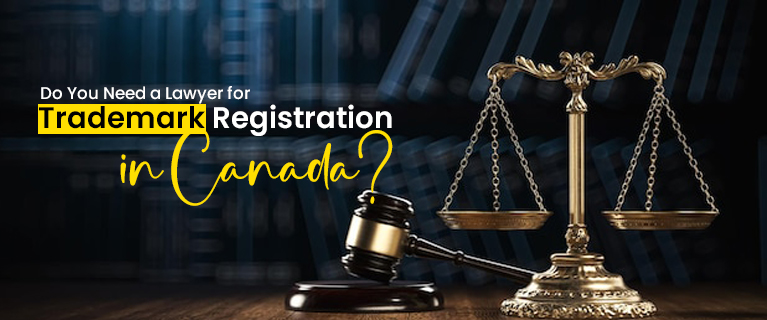In the competitive landscape of business, establishing a strong brand identity is paramount to success. Whether you’re a local startup or eyeing expansion into national or international markets, safeguarding your brand through trademark registration is a crucial step. However, amidst the complexities of Canadian trademark law, the question arises: do you need a lawyer to navigate the trademark registration process effectively?
Trademark registration in Canada involves several steps, from conducting a comprehensive trademark search to filing the application and responding to any objections from the Canadian Intellectual Property Office (CIPO). While it’s possible to navigate this process without legal assistance, there are significant benefits to enlisting the expertise of a trademark lawyer.
Trademark Registration in Canada:
Picture this: Your client is gearing up to invest significantly in packaging, signage, and marketing strategies to elevate their brand presence. They understand the inherent risks associated with leaving their brand unprotected. Without a registered trademark, their rights are limited to the geographic area where the mark is used. This poses a significant threat, especially if expansion plans are on the horizon.
The Importance of Registered Trademarks vs. Common Law Rights
While common-law trademark rights exist, they pale in comparison to the protections offered by registered trademarks. With a registered trademark, you gain exclusive rights to use the mark across Canada for 15 years, renewable indefinitely. Moreover, registration serves as prima facie evidence of ownership, easing the burden of proof in case of disputes.
Read also this -: The Cost of Trademark Registration in Canada
Registered Trademarks: Unmatched Protection and Benefits:
1. Comprehensive Protection:
Registered trademarks grant exclusive rights to use the mark across Canada for 15 years, with the option of indefinite renewal. This exclusivity empowers trademark owners to prevent others from using identical or confusingly similar marks in connection with similar goods or services.
2. Prima Facie Evidence of Ownership:
Trademark Registration in Canada serves as prima facie evidence of ownership, easing the burden of proof in case of legal disputes. This evidentiary advantage streamlines litigation procedures and provides a solid foundation for asserting and defending trademark rights in court.
3. Enhanced Visibility and Credibility:
Registered trademarks enjoy enhanced visibility and recognition within the marketplace.
The official registration symbol (®) signals to consumers and competitors that the mark is legally protected, instilling confidence in the authenticity and quality of associated products or services.
Heightened credibility can bolster brand loyalty and influence purchasing decisions, driving business success and growth.
4. Nationwide Exclusivity:
Registered trademarks offer nationwide exclusivity, protecting the mark’s integrity and reputation across all provinces and territories of Canada. This nationwide scope ensures consistent and uniform protection, regardless of geographic location or market presence.
Common Law Trademark Rights: Limited Protections and Challenges
1. Established Through Use:
Common law trademark rights are established through consistent and continuous use of a mark in commerce, without the need for formal registration. These rights accrue over time based on the mark’s recognition and association with specific goods or services.
2. Geographic Limitations:
Common law rights usually only cover the regions in which consumers have actively utilized and recognized the mark. This limited scope restricts the enforceability of rights beyond the specific regions where the mark has gained recognition.
3. Lack of Legal Presumption:
Unlike registered trademarks, common law rights lack the same level of legal presumption of ownership. Enforcing common law rights often requires extensive evidence and documentation to establish the existence and validity of the rights.
4. Vulnerability to Infringement:
Common law rights are susceptible to infringement by third parties who may adopt similar marks in distant geographic regions or industries. Enforcing common law rights across multiple jurisdictions can be challenging and cost-prohibitive, leaving trademark owners vulnerable to unauthorized use and dilution of their brands. While common law rights provide a foundation for establishing trademark rights through use, registered trademarks offer unparalleled levels of certainty, exclusivity, and legal recourse. By securing a registered trademark, businesses can fortify their brands, deter infringement, and cultivate enduring relationships with consumers, laying the groundwork for long-term success and competitiveness in the marketplace.
Read also this -: How to Register your Business Trademark in Canada
Why Do You Need a Lawyer?
Navigating the intricacies of trademark law requires expertise and finesse. While it’s possible to file a trademark application independently, the stakes are high. Hiring a knowledgeable trademark lawyer can provide invaluable guidance throughout the process, from conducting comprehensive searches to navigating potential legal hurdles.
Trademark Searches and Applications:
Trademark searches are more than just a cursory glance at existing marks. They require meticulous attention to detail and a nuanced understanding of trademark law. A seasoned trademark lawyer can conduct thorough searches to assess the availability of your desired mark and mitigate potential conflicts.
Trademark Registration May Require Legal Action
In the event of oppositions or infringements, having a lawyer on your side is indispensable. From addressing issues with your application to representing you in court, a skilled trademark lawyer can safeguard your interests and ensure the protection of your brand.
The Lengthy Trademark Registration Process
Patience is indeed a virtue when it comes to trademark registration in Canada. The process can be lengthy, often spanning 12-18 months, with potential delays due to examination and oppositions. Entrusting this task to a lawyer or agency frees up your time to focus on growing your business while ensuring that your trademark application progresses smoothly.
Why Choose a Trademark Agency?
One of the primary reasons to consider hiring a trademark lawyer is their knowledge and experience in navigating the intricacies of Canadian trademark law. They can conduct thorough trademark searches to ensure your proposed mark is unique and not already in use by another entity. This step is crucial as it helps avoid potential conflicts and costly legal disputes down the line.
Moreover, trademark lawyers understand the nuances of the application process and can help you prepare a robust application that meets all the requirements set forth by CIPO. From selecting the appropriate trademark classification to drafting the application with clarity and precision, their expertise can increase the likelihood of a successful registration.
In addition to guiding you through the initial application, a trademark lawyer can also assist in responding to any objections raised by CIPO during the examination process. This may involve drafting legal arguments and providing evidence to support the distinctiveness of your mark, ensuring the best possible outcome for your application.
Furthermore, trademark lawyers can offer strategic advice on trademark protection beyond the registration process. They can help develop a comprehensive trademark strategy tailored to your business goals, including enforcement measures to protect your brand from infringement and unauthorized use.
Among the myriad trademark agencies in the market, TrademarkCart stands out as a trusted partner for businesses seeking reliable and cost-effective trademark services. Here’s why you should consider selecting TrademarkCart as your trademark attorney:
- Expertise and Experience: TrademarkCart boasts a team of experienced trademark attorneys who possess in-depth knowledge of trademark law and procedures. Their expertise enables them to navigate the complexities of trademark registration with precision and confidence, ensuring optimal outcomes for their clients.
- Comprehensive Services: From conducting comprehensive trademark search to filing applications and responding to office actions, TrademarkCart offers a full suite of trademark services to meet the diverse needs of businesses. Their end-to-end approach streamlines the trademark registration process, saving clients time and effort.
- Transparent Pricing: At TrademarkCart, transparency is paramount. They offer flat-rate pricing for their trademark services, eliminating the guesswork associated with hidden fees or unexpected charges. Clients can rest assured that they are receiving quality trademark services at a fair and competitive price.
- Client-Centric Approach: TrademarkCart is committed to providing personalized and attentive service to each client. They take the time to understand their clients’ unique needs and objectives, tailoring their services accordingly to deliver customized solutions that exceed expectations.
In Essence, choosing a trademark agency like TrademarkCart offers businesses a cost-effective and efficient way to protect their valuable intellectual property assets. With licensed trademark attorneys at the helm and a commitment to transparency and client satisfaction, TrademarkCart is the ideal partner for businesses seeking reliable trademark services that deliver results.
Conclusion:
In conclusion, the decision to enlist legal assistance for trademark registration in Canada is not just prudent but imperative. From conducting thorough searches to navigating the nuances of trademark law, a skilled lawyer or agency can provide invaluable support throughout the registration process. By investing in legal expertise, businesses can safeguard their brands and pave the way for future growth and success in the competitive marketplace.
In the realm of trademark registration, the old adage holds true: an ounce of prevention is worth a pound of cure. So, before embarking on your trademark registration journey, consider partnering with a trusted trademark lawyer or agency to navigate the complexities of Canadian trademark law with confidence and peace of mind.


